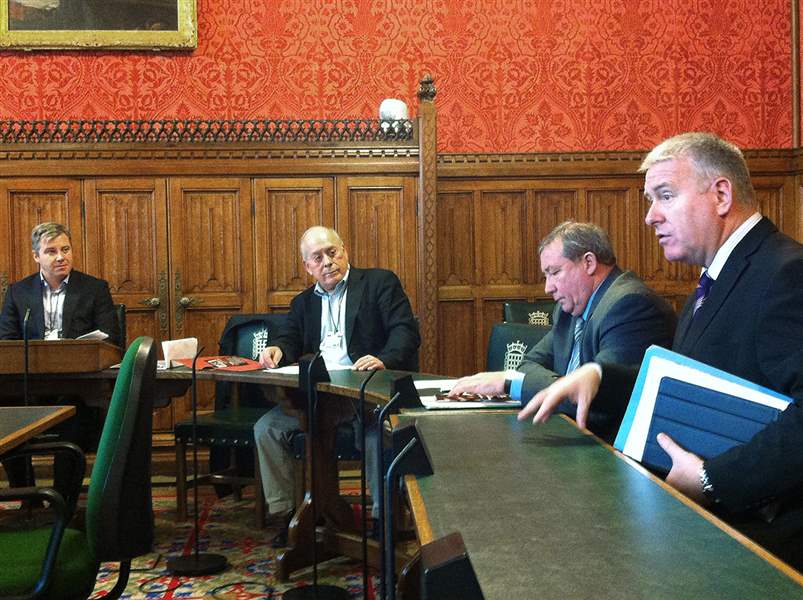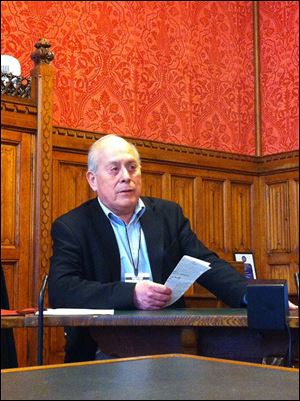
Brits pledge to aid FLOC's fight
Velasquez brings human-rights concerns to British Parliament
12/13/2013
FLOC founder Baldemar Velasquez, center, meets with Unite national officer Rhys McCarthy, left, and Parliament members James Sheridan and Ian Lavery to discuss conditions in North Carolina tobacco fields.
AARON CHAPPELL

FLOC founder Baldemar Velasquez, center, meets with Unite national officer Rhys McCarthy, left, and Parliament members James Sheridan and Ian Lavery to discuss conditions in North Carolina tobacco fields.
LONDON — Toledo union leader Baldemar Velasquez has traveled the world championing for workers’ rights, and Thursday he received a commitment of help for his efforts from members of the British Parliament.
Mr. Velasquez, president and founder of the Farm Labor Organizing Committee, spoke before members of the Parliament about his campaign to stamp out the human-rights abuses of migrant workers in tobacco fields.
He shared his own memories of growing up as a migrant farm worker picking cherries, apples, oranges, and onions to help his family survive.
“Agricultural workers have historically been excluded from labor laws in the United States,” Mr. Velasquez told them.
“The only laws that are being legislated [are] to further create exploitation of agriculture workers.”
Two members of Parliament with a history of fighting for labor rights vowed to support his campaign against tobacco giants.
Labor Party members Jim Sheridan and Ian Lavery listened as Mr. Velasquez detailed some of the atrocious conditions he said people are forced to live and work under in North Carolina.
He recounted the story of one man who died in 2001 after complaining of heat exhaustion. Rubano Ramirez went to rest beneath a tree and his decomposed body was discovered eight days later, Mr. Velasquez said.
Mr. Sheridan, who worked in shipyards before entering politics, offered to raise the issue in the House of Commons as an early day motion, a way elected officials can draw attention to a campaign in front of other members of Parliament.
He also offered to get a number of MPs to sign a letter to British American Tobacco expressing their concerns over its relationship with Reynolds America Inc. and its treatment of workers.
“We are with you all the way,” Mr. Sheridan told Mr. Velasquez.
“They shouldn’t be working in these conditions or even living in these conditions in this day and age.”
The hour-long meeting took place in a committee room in the Houses of Parliament, the epicenter of British government.
Mr. Velasquez was one of several labor and human rights leaders from across the country who addressed concerns about how American tobacco companies treat workers.

Baldemar Velasquez, president and founder of the Farm Labor Organizing Committee in Toledo, joined labor and human rights leaders in London to address how tobacco firms treat workers in the United States.
Rhys McCarthy, national officer for food, drink, and tobacco at Unite the Union, chaired the meeting, which was also attended by a number of representatives of religious organizations.
Both MPs expressed surprise that the situation Mr. Velasquez described was able to exist in the United States, equating it to the kinds of conditions one would expect in an underdeveloped nation.
“We have got to do everything we possibly can. Meetings like this are very important. … It’s imperative to keep up the good work,” Mr. Lavery said.
“It’s always a small few that make a massive difference,” he added.
Mr. Velasquez’s journey to London had two objectives.
One was to meet with the elected officials and highlight his cause.
He also intended to lobby British American Tobacco executives and invite them to see the working conditions in North Carolina for themselves.
British American Tobacco owns more than 42 percent of the tobacco company Reynolds America. After the presentation, Mr. Velasquez and other leaders met with tobacco officials to discuss the issues.
A British American Tobacco spokesman said of the meeting: “British American Tobacco has a long history of working constructively with organized labor and we have always believed the best approach to contentious issues is to engage through dialogue. We had a productive meeting with FLOC today and they have raised some concerns which we will be investigating further.”
Mr. Velasquez said after the presentation that he was thrilled with the response.
“I’m on cloud nine,” he said.
“I think the biggest thing that came out was the offer to enact some action in Parliament. I think that is huge because that’s going to put an enormous amount of pressure on British American Tobacco to do something about the inequities in the supply chain.
“It’s above and beyond … to me that was phenomenal.”
Reynolds officials weren’t invited to the meeting, but company leaders late Wednesday night submitted a letter warning the British that they have no legal right to interfere in the tobacco company’s American operations.
The letter, which was signed by Reynolds Vice President John S. Wilson III, said Reynolds is blameless and powerless to stop any abuses because it contracts with independent contractors who operate the tobacco fields.
Mr. Wilson also said in the letter, which was obtained by The Blade, that FLOC is trying to force Reynolds into appointing FLOC as the official union for the tobacco workers, which it says is a violation of North Carolina law.
Blade staff writer Federico Martinez contributed to this report.